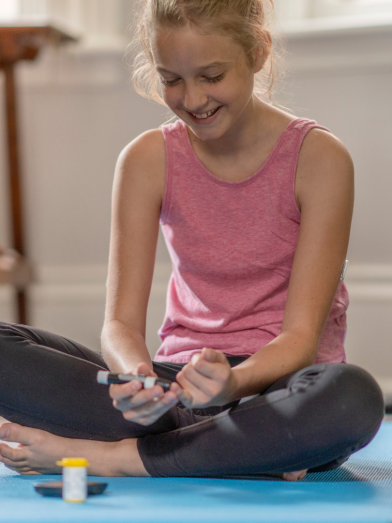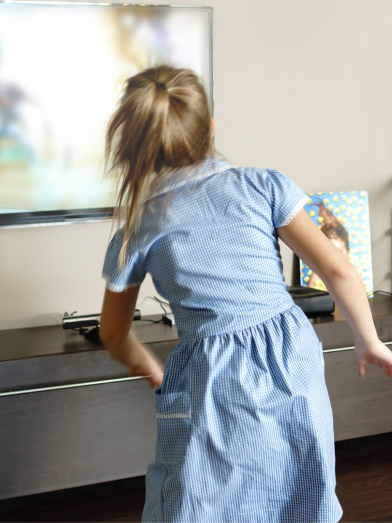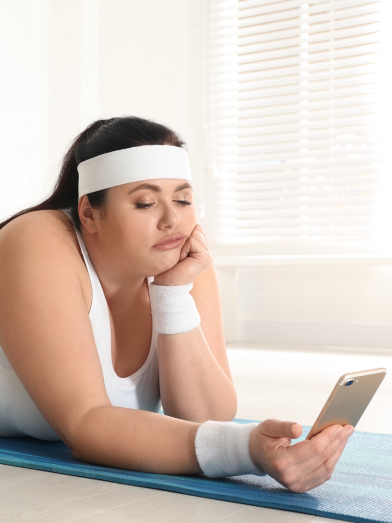Do you view exercise with the same enthusiasm usually reserved for preparing your taxes? Perhaps you work out to maintain your weight and reach your blood glucose (also called blood sugar) targets, but you’ve never experienced anything near a runner’s high and have beaten yourself up for letting more than a few gym memberships go unused.
You’re hardly alone. According to the Centers for Disease Control and Prevention’s (CDC) National Center for Health Statistics, about 26% of Americans don’t participate in leisure time physical activity—at all.
A matter of mindset
One unexpected culprit may be the things we tell ourselves about exercise before we even lace up our sneakers. Being active reduces your risk for heart disease, promotes lower blood pressure, contributes to weight loss and can help keep your blood glucose in check—all important. But seeing exercise as something you need to do solely to meet long-term health goals can make you miss out on its other more immediate benefits, such as having fun (yes, really!) or feeling less stressed and more energetic.
Exercise is often recommended prescription-style, not suggested as a fun part of life. Reframing physical activity helps people view it as a friend, instead of an enemy, and embrace it when they do it, instead of feeling like they are suffering. Reframing exercise also helps shed light on its less-obvious benefits, such as feeling more focused and alert.
Define and redefine
We may also have a rigid idea of what counts as exercise. In a study by BMC Public Health, focus groups were conducted among women to find out how physical activity fit in with their daily goals and priorities. Many who were less active said they associated only certain types of exercise, such as sweaty gym workouts, with achieving fitness goals. Yet simply choosing an activity that you enjoy—whether it’s an advanced spin class or a walk at the mall—makes it far more likely that you’ll move more.
In terms of sticking with an exercise plan, it helps if you feel like you have some control over how exercise works toward your goals and how it would benefit you mentally, physically, socially or spiritually. The key is to look at exercise in terms of what it can do for you right now, not down the road. That shift in thinking could also reduce stress and increase positive emotions—things that we know promote health.
5 ways to make exercise more fun
Ready to add some fun to your exercise plan? Here are five ways:
- Redefine “exercise”
Exercise doesn’t have to be an hour-long run that leaves you sweaty and winded. Even 10 minutes per week of a leisure activity such as gardening or dancing can lower your risk for early death from cardiovascular disease, among other conditions. The point is to find pleasure in the activity you’ve chosen. - Get social
Enlisting a fitness buddy doesn’t just make you accountable—it ups the fun factor, too! Taking a class or working out in a group also multiplies the benefits of exercise. Many have programs geared to seniors, such as water aerobics, low-impact cardio workouts and light weight training. Another great option is to get your family together and start a team to take part in American Diabetes Association’s Step Out Walk to Stop Diabetes® or Tour de Cure®! Find an event near you. - Make exercise an adventure
Learning something new can be an effective motivator for exercise. It can help you discover new activities you enjoy, stimulate your interest and reveal skills you may not even know you have (perhaps you’re an ace at fencing!). Predictable, repetitive experiences are also prime causes of boredom, so consider trying a dancing class, or go kayaking, rock climbing or kickboxing. - Add the fun factor
Experts often suggest choosing activities you enjoy. But what if you just don’t like working out? Try pairing exercise with something you already like doing. Lift light weights while watching your favorite cooking show or play Frisbee in the park while spending time with your kids or grandkids. - Turn up the tunes
Feeling blah about your workout? Turn on some music. Studies suggest that listening to music while exercising can help distract you from fatigue and discomfort, motivate you to work harder and put you in a better mood.








